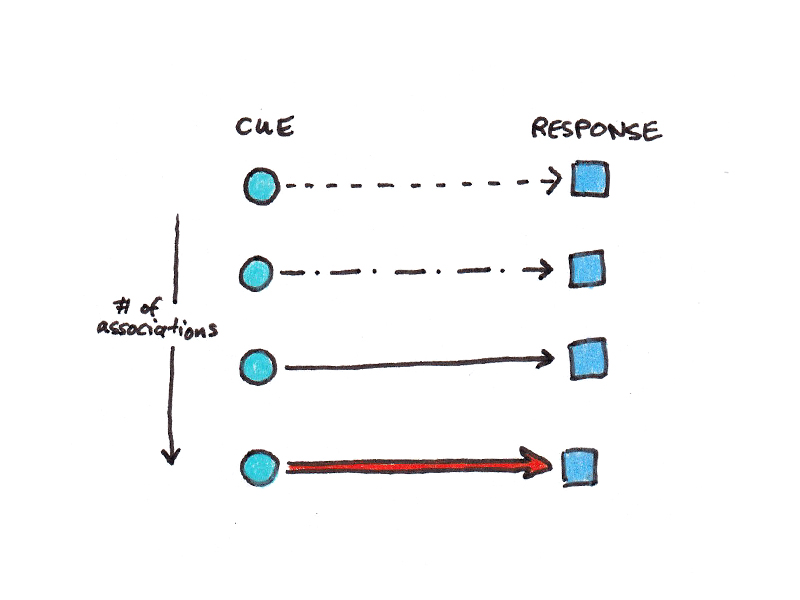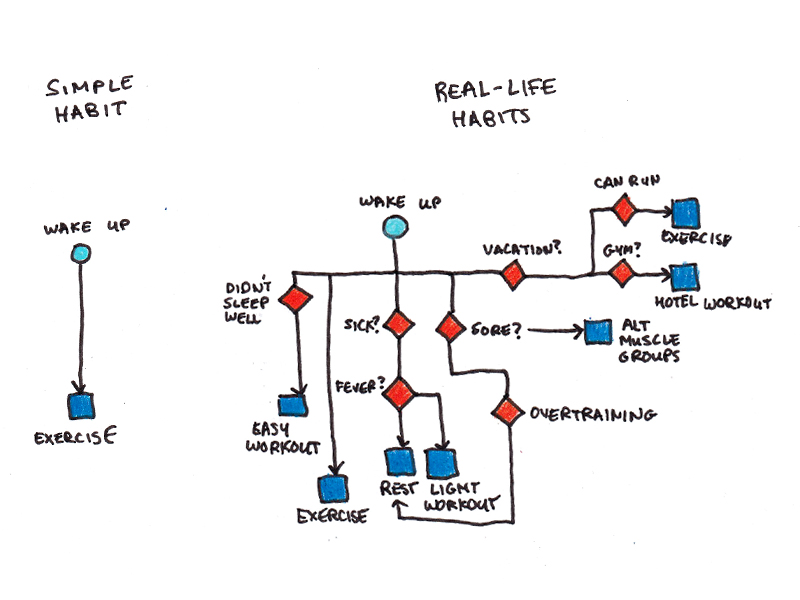I’ve been pondering lots about habits these days. The scholars in my Foundations course are getting began with their day by day health behavior, and this has given me plenty of insights into the true limitations individuals have in creating habits that final.
The straightforward mind-set about habits is as a cue, adopted by a response. So, in the event you’re attempting to begin exercising, you would possibly consider a behavior as:
CUE: I end work for the day -> RESPONSE: I am going to the health club.
CUE: I get up within the morning -> RESPONSE: I am going for a run.
CUE: I end placing the children to mattress -> RESPONSE: I do a house exercise.
Over time, these cue-response relationships strengthen. This makes deciding to train extra computerized and easy over time. In the event you at all times work out proper while you get up, it might really feel bizarre at first, however after three months, it feels completely regular.

That is the precept of classical conditioning, first found when Ivan Pavlov realized his canines would salivate when listening to the dinner bell, even earlier than the meals the bell predicted confirmed up. Classical conditioning is ubiquitous within the animal world—even sea squirts do it—thus, it’s as near a common precept of psychology as one can get.
On the similar time, anybody who has really began a brand new behavior, resembling train, is aware of that actual life isn’t so easy.
The Drawback with Habits in Actual Life
The cue-response relationship is an effective primitive psychological mannequin of behavior formation. However actual life is much more difficult.
For one, plenty of our “habits” aren’t constant cue-response relationships. Even one thing so simple as day by day train has an infinite quantity of complexity:
- What do you do while you’re on trip?
- How do you deal with work overrunning into your exercise slot?
- What about when the health club is closed for repairs? Your automotive breaks down? Your trainers put on out and it’s essential to purchase new ones?
- What about while you’re sore from one exercise and have to do one other one?
And that is for a comparatively “easy” behavior like train.1 Most foundations we wish to enhance contain far more difficult habits.

Wholesome consuming, for example, is far more difficult than health. As a substitute of a easy cue-response, consuming properly depends on constructing myriad habits: What do you eat for breakfast? Sack lunch or consuming out? How do you deal with vacation treats? What about workplace blissful hour?
Regardless of these complexities, many individuals handle to type efficient, lifelong behavioral enhancements in these areas. It’s in all probability not by means of merely strengthening a cue-response affiliation, so what’s actually occurring?
Behavior-Formation as Drawback-Fixing and Ability Studying
Psychology has one other psychological mannequin we are able to have a look at for habits change: the science of problem-solving and the acquisition of experience.
Drawback-solving is all about coping with distinctive circumstances in acceptable methods. Is the best way ahead a useless finish? Discover a detour. Did one thing intervene along with your plan? Throw it out and draft a brand new one. Not like classical conditioning, problem-solving is a capability distinctive to extra complicated organisms, reaching its highest expression in people. With it, we don’t study solely by means of cue and response, however can type plans, methods, intentions and options.
As we proceed to unravel issues, we purchase experience. Experience is, in some ways, an elaboration of the cue-response associations possessed by easier organisms. As we repeatedly encounter a wide range of completely different situations, we develop well-worn options.
However experience is greater than only a assortment of habits. We even have concepts and psychological fashions that information our actions. Seeing the automotive brake in entrance of you all of a sudden and slamming in your automotive’s brakes is a behavior. Recognizing that you simply’re driving at freeway speeds and giving the automotive forward of you extra room in case it’s essential to brake is experience.
Studying a New Behavior
What does this considerably altered perspective say in regards to the habits we wish to type to maintain our lives? I feel it means that one thing extra subtle is happening after we “situation” a brand new behavior. Sure, we do type cue-response associations, however we additionally do greater than that.
First, we set objectives and intentions. We select to set increased requirements to carry ourselves accountable. Drawback-solving is goal-directed—we resolve a type of habits we wish to have in our day by day routine, and we maintain that intention in thoughts as we attempt to discover methods to unravel it in every set of distinctive day by day circumstances.
Second, we create methods. Methods are extra than simply cue-response associations. For one, they’re aware. “I’ll get up within the morning to train” does set up a cue-response, however it additionally encourages you to be conscious of your earlier intention while you get up.
Third, we study to cope with particular issues. As our “conditioning” progresses, we cope with distinctive challenges and determine customized options. What do you do while you’re drained? Sore? Sick? On trip? When the health club is closed or the climate is dangerous? There aren’t any “proper” solutions, however in the event you resolve these subproblems efficiently, you’ll enhance your means to stay to the intention you set and the methods you articulated.
The cue-response framework is useful, however typically it may well implement an excessively inflexible notion of what’s going on after we efficiently implement habits change. The fact is that making a brand new habits a part of your life is essentially a studying problem—a means of successive problem-solving till you’ve gotten discovered methods to resolve a lot of the points you face in your day by day life.
The end result shouldn’t be one behavior, however many. Not a cue-response relationship, however a set of versatile methods that cope with most situations actuality throws at you. Once you’ve completed that, you’re acquired a type of experience—not of a topic, however of your self.

